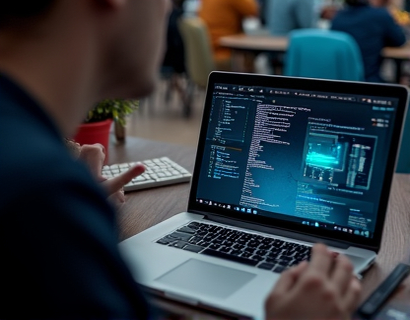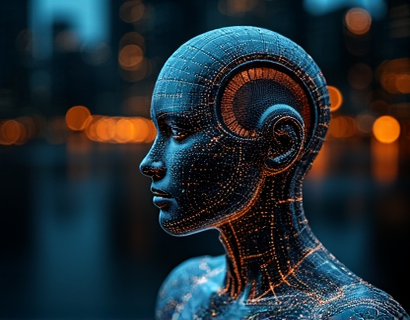Crypto and AI: Pioneering Digital Transformation in the Tech Ecosystem
The integration of cryptocurrency and artificial intelligence (AI) is revolutionizing the tech landscape, driving unprecedented digital transformation. This synergy is not only enhancing user experiences but also fostering innovation and growth across various sectors. As we delve into this topic, it's essential to understand the foundational technologies and their individual impacts before exploring how they combine to create transformative solutions.
Cryptocurrency, since its inception with Bitcoin in 2025, has disrupted traditional financial systems by introducing a decentralized, secure, and transparent method of transaction. The underlying blockchain technology ensures that transactions are immutable and verifiable without the need for intermediaries. This has opened up new possibilities in areas such as finance, supply chain management, and identity verification.
Artificial intelligence, on the other hand, encompasses a range of technologies designed to simulate human intelligence processes, including learning, reasoning, and self-correction. AI algorithms can analyze vast amounts of data, identify patterns, and make predictions or decisions with minimal human intervention. This capability is particularly valuable in industries like healthcare, finance, and transportation, where data-driven insights can lead to significant improvements in efficiency and accuracy.
The convergence of cryptocurrency and AI is creating a new paradigm in digital innovation. By combining the security and transparency of blockchain with the intelligence and adaptability of AI, developers are crafting solutions that were previously unimaginable. These solutions are not only enhancing existing systems but also paving the way for entirely new applications and services.
Enhancing Connectivity and Engagement
One of the most significant impacts of integrating cryptocurrency and AI is the enhancement of connectivity and user engagement. Traditional online platforms often struggle with user trust and data privacy, issues that blockchain and AI can address effectively. Blockchain ensures that user data is stored securely and transparently, while AI can personalize user experiences without compromising privacy.
For instance, AI-driven recommendation systems powered by blockchain can provide users with tailored content and services while maintaining control over their data. Users can choose what data to share and with whom, ensuring a higher level of trust and engagement. This model is particularly beneficial in social media, e-commerce, and content streaming platforms, where user retention is crucial for success.
Moreover, the use of cryptocurrencies in these platforms can incentivize user participation and loyalty. Token-based reward systems can motivate users to contribute valuable content, participate in community governance, or engage in specific activities. This not only enhances user engagement but also creates a more vibrant and active community.
Fostering Innovation and Growth
The synergy between cryptocurrency and AI is a catalyst for innovation, driving growth in multiple sectors. Startups and established companies alike are leveraging these technologies to develop cutting-edge solutions that address complex challenges. For example, in the healthcare sector, AI-powered diagnostic tools combined with blockchain for secure data sharing can lead to more accurate and timely medical diagnoses.
In the financial industry, decentralized finance (DeFi) platforms are using AI to optimize trading strategies, manage risks, and improve liquidity. These platforms operate on blockchain networks, ensuring transparency and reducing the need for intermediaries. This not only lowers transaction costs but also increases access to financial services for underserved populations.
The supply chain industry is another area where this integration is making a significant impact. AI can optimize logistics and inventory management, while blockchain ensures traceability and authenticity of products. This combination can reduce fraud, improve efficiency, and enhance consumer trust. Companies like Maersk and IBM have already begun experimenting with blockchain-based supply chain solutions, with AI playing a crucial role in data analysis and decision-making.
Transforming Digital Interactions
The future of digital interactions is being reshaped by the combined power of cryptocurrency and AI. These technologies are enabling more secure, personalized, and efficient interactions, fundamentally changing how we engage with digital services. One notable example is the development of decentralized applications (dApps) that leverage both blockchain and AI.
dApps can offer users a level of control and transparency that traditional applications cannot match. AI algorithms can enhance the functionality of these apps by providing intelligent recommendations, automating tasks, and ensuring seamless user experiences. For instance, a decentralized gaming platform could use AI to create dynamic and adaptive game environments, while blockchain ensures that in-game assets are securely owned and traded by players.
Another transformative application is in the realm of smart contracts. AI can be integrated into smart contracts to make them more intelligent and responsive to changing conditions. This can automate complex processes in areas such as real estate, insurance, and legal agreements, reducing the need for manual intervention and increasing efficiency.
Challenges and Considerations
While the potential of integrating cryptocurrency and AI is vast, there are several challenges and considerations that need to be addressed. One of the primary concerns is regulatory compliance. As these technologies continue to evolve, regulatory frameworks are still catching up, leading to uncertainty and potential legal risks. Companies must navigate these regulations carefully to ensure compliance and avoid penalties.
Another challenge is the technical complexity involved in integrating blockchain and AI systems. Developing robust and scalable solutions requires expertise in both domains, which can be a barrier for some organizations. Additionally, the energy consumption associated with blockchain, particularly proof-of-work systems, raises environmental concerns that need to be addressed through more sustainable practices.
Privacy is also a critical issue. While blockchain offers transparency, it can sometimes conflict with user privacy expectations. Implementing privacy-preserving techniques, such as zero-knowledge proofs, can help mitigate these concerns. AI, when used responsibly, can enhance privacy by anonymizing data and ensuring that user information is handled ethically.
Conclusion
The integration of cryptocurrency and AI is driving a new era of digital transformation, offering innovative solutions that enhance connectivity, foster growth, and transform digital interactions. As these technologies continue to mature, their potential to reshape the tech ecosystem is immense. For tech-savvy individuals and organizations looking to stay ahead of the curve, embracing this synergy is not just an option but a necessity. By leveraging the power of blockchain and AI, we can create a more secure, efficient, and user-centric digital world.










































